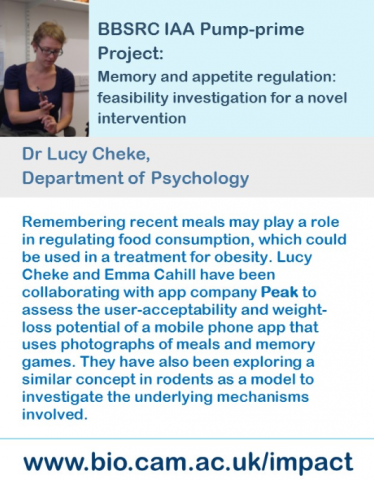|
|
|
Obesity has quickly become a significant health concern worldwide. In the UK, a quarter of all adults are obese and currently available treatments have not been suppressing an upwards trend effectively. New approaches for treating obesity are needed, and recent evidence suggests that memory may play a role in regulating food consumption.
In the Department of Psychology, Dr Lucy Cheke and colleague Dr Emma Cahill have been working on developing new approaches for treating obesity based on meal memory. The BBSRC Impact Acceleration Account pump-prime funding has enabled them to carry out two complementary projects to study how meal memory affects feeding behaviour.
In collaboration with app company Peak, the first project is the development and testing of a mobile phone app that encourages users to think about their recent and current meals in greater detail. Lucy will be assessing the potential of the app as a weight loss aid through a study with volunteers.
“Studies have shown that vividly remembering a recent meal tends to make people eat less at a following meal,” explains Lucy. “We want to apply that principle in a non-judgemental, easy-to-use weight loss app.”
Before each meal, the volunteers will answer a couple of questions on the app about their previous meal, including how it tasted, who they ate with and how filling the meal was. They are then invited to photograph their current meal and consider how hungry they are in that moment. After the meal, they answer a few questions on the food they just ate.
“We hope that by reminding people about their recent meals and encouraging them to concentrate more on what they’re eating, they’ll feel a little less hungry each time and eat a little less in each meal, which in the long term will lead to weight loss.”
The second project focuses on exploring the role of meal memory in rodents. Rodents will be presented with different stimuli when they are hungry and when full, and later observed under a different context to assess whether the presentation of the stimuli can alter normal feeding behaviour. The aim is to use the outcome of this project to inform strategies for humans, as brain circuits underlying feeding are well-conserved between mammals.
Lucy hopes that the two projects will inform further research, and lead to clinical and behavioural interventions that can improve the quality of life for many people worldwide.
“These are quite short proof-of-concept studies, but they are vital for us to be able to take this research forward and develop interventions to tackle overeating and weight gain.”


